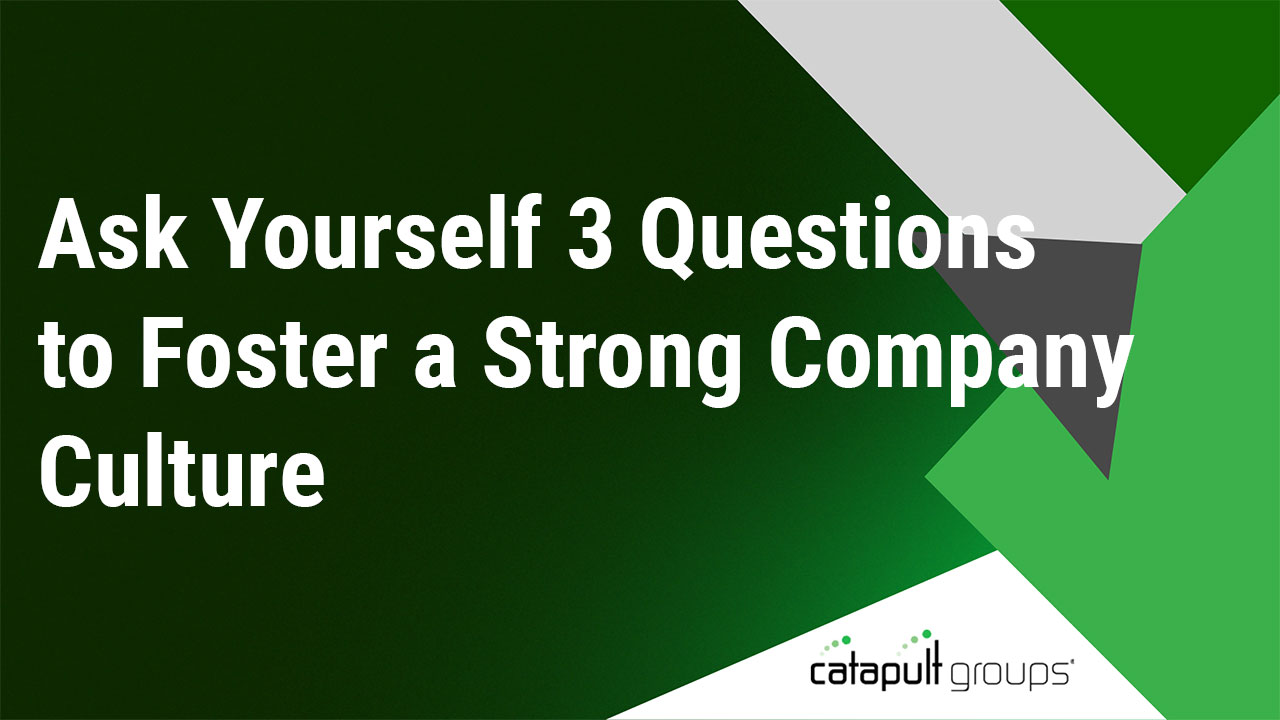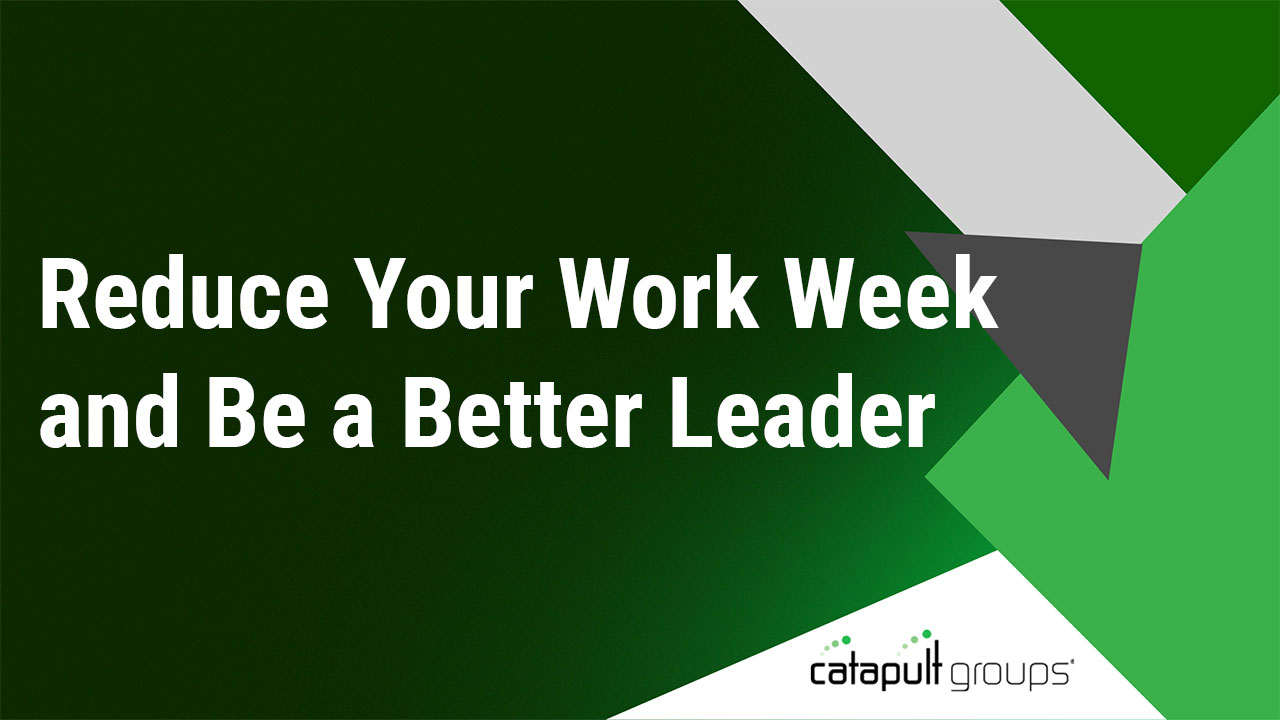How Executive Coaching Helps Prevent Burnout in CEOs
If you haven't experienced burnout at the executive level, you've certainly heard about it. If you’re doing more with less in the post-pandemic market, executive burnout can feel like a stormcloud: Not raining yet, but a looming threat.
Burnout is an "occupational phenomenon" of motivation, creativity and emotional resilience. It spawns from chronic workplace stress that hasn’t been successfully managed eventually (World Health Organization). Left unresolved, it erodes both personal and professional drive until emotional exhaustion catches up.
If you're a CEO, entrepreneur, or high-level decision-maker, here are five practical, research-backed ways to prevent burnout and preserve your ability to lead with clarity, courage, and long-term impact.
You Learn to Anchor Yourself to a Long-Term Vision
One of our Catapult Groups workshop speakers, Boaz Rauchwerger, says that when the why is big enough, the how doesn’t matter.
Leaders rarely burn out on bold missions because purpose breeds passion. It's that irresistible feeling at the end of the day, when you know you've made a difference.
Just like skunks. “Skunk Works” was the official alias for Lockheed Martin’s Advanced Development Programs. In October 1943, Skunk Works had to develop a jet fighter that would match the world's most powerful jet engine: the British Goblin.
In 150 days.
But against the odds, "Skunk Works" succeeded in 143 days and delivered the Shooting Star.
Leaders, take note: Strong why = Strong day-to-day. By building and communicating a long-term vision, you help both yourself and your team members stay emotionally invested and focused. A clear vision can cut through stress triggers, anchor strategic thinking, and energize even the most complex initiatives.
You Learn to Hire an Awesome Team
You can’t do it all (and you shouldn’t have to).
To reduce burnout, surround yourself with people who bring optimism and ownership to the table. Create a company culture where collaboration thrives and emotional safety is a norm, not an exception.
High-functioning teams recognize stress triggers, practice emotional intelligence, and support each other through both wins and challenges. High-functioning teams encourage open communication, which lets you identify warning signs of CEO burnout early.
Building trust and shared responsibility allows leaders to delegate more effectively. That’s crucial for work-life balance, especially in high-pressure industries. When you can offload decision-making, you offload fatigue, too.
You Learn to Take Intentional Breaks
When you're moving from meeting to meeting or buried under back-to-back deadlines, it’s easy to ignore how stress levels are building. But burnout doesn’t hit all at once, it creeps in gradually (often masked as "just being busy").
Take space to recharge emotionally and physically. That means deeper resets that combat the stress inherited from your typical routine.
Change your scenery. Get outdoors. Take a trip without your laptop. Or join a class that has nothing to do with work!
These are all strategies to protect your brain's creative and emotional bandwidth. That way, your mind stores energy so you can show up for your team when it matters. These habits not only manage stress levels but also increase your capabilities when they matter most.
You Learn to Prioritize Your Health
You need to treat mental health as seriously as you treat any metric.
And yes, that includes yourself. No more excuses.
A healthy work-life balance starts and ends with a calendar that enforces boundaries (more on that later). Block off time for workouts, sleep, unplugged hours and other non-work items. Then, model these habits for your team members to normalize well-being and a resilient work environment.
Health prioritization also includes eating energy-sustaining foods, moving your body daily, and staying on top of regular health check-ins. What have you been meaning to change about your health? Don't wait another day!
You Learn to Set Clear Boundaries and Expectations
Boundaries protect your time, focus, and energy. Without them, the line between work and life becomes blurred, and stress quickly takes over both worlds.
Boundaries include setting specific hours when you are unavailable, or declining meetings that lack a clear purpose. It looks like encouraging your team to make decisions independently when possible. It may also mean defining expectations with clients, stakeholders, and team members so that you are not on-alert 24/7.
Reduced availability does not mean reduced respect. When people understand how and when to engage with you, it removes decision fatigue and emotional strain. Also, modeling healthy boundaries at the leadership level creates a culture where others feel empowered to do the same. Be brave and take the first step!
Bonus: You Learn to Be Strategic and Encourage Others to Participate
Your job as CEO isn’t to have all the answers, but rather to train others so they can identify solutions and propose ideas. That means prioritizing time for strategic planning, vision casting and identifying future risks or growth opportunities.
Take the Next Step Toward Sustainable Leadership
Stress management doesn’t happen in isolation. One of the most effective ways to stay clear-headed is by participating in a peer advisory group. That's why Catapult Groups exists. Surrounded by fellow business leaders who understand your challenges firsthand, you'll find advice, solidarity, peer support, and renewed purpose.
Our mastermind-style groups help you talk through high-stress issues before they build up. They keep your thinking sharp and focused on strategy. They also hold you accountable to boundaries you often ignore.
If you’re ready to lead with more clarity, energy, and support, a Catapult Group could be the catalyst you need. Book your free, 30-minute no-obligation call today. And discover how peer accountability and strategic coaching can help you build a more resilient business and a healthier life.
Are you a CEO, President, or business owner based in Las Vegas? Is your company established and open to innovative thinking? You are cordially invited to attend a Candidate Breakfast, hosted by Group Leader David Housey, on Tuesday, September 23rd at the Charlie Palmer Restaurant inside the Four Seasons Hotel. Click here for more information or to register.



